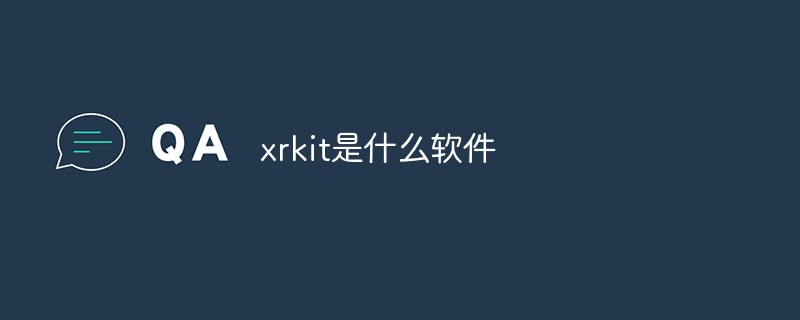mozilla, the full name of Mozilla Firefox, is a free and open source web browser and an application for retrieving and displaying World Wide Web information resources. Mozilla Firefox supports a variety of operating systems, such as Windows, macOS, and GNU/Linux. Its mobile version supports Android and Firefox OS. These versions of Firefox use Gecko to format web pages.

The operating environment of this tutorial: windows7 system, Mozilla Firefox 104.0.1.8276, Dell G3 computer.
mozilla's full name is Mozilla Firefox, commonly known as "Firefox" in Chinese (formally abbreviated as Fx or fx), is a free and open source web browser developed by Mozilla.
A web browser (English: web browser), often referred to as a browser, is an application used to retrieve and display information resources on the World Wide Web. These information resources can be web pages, pictures, videos or other content, which are identified by uniform resource identifiers. Hyperlinks in information resources allow users to browse related information easily.
Firefox supports Windows, macOS and Linux, and its mobile version supports Android and Firefox OS. These versions of Firefox use Gecko to format web pages. Gecko is a formatting engine that runs current and expected web standards. Firefox for iOS, released in 2015, does not use Gecko.
Firefox has two upgrade channels: rapid release version and extended support version (ESR). Rapid releases release a major version every four weeks. During this four-week period, there will be minor versions that fix crashes and security vulnerabilities. The extended support version releases a major version every 42 weeks, with minor versions related to fixing crashes, security vulnerabilities, and policy updates at least every four weeks.

Firefox was created in 2002 by members of the Mozilla community and was called "Phoenix" because the community members wanted a standalone browser instead of Packages like Mozilla Application Suite. Even in beta, Firefox was popular among testers and was praised for its speed, security, and extensions. Firefox was first released in November 2004 and was a huge success with over 60 million downloads within 9 months, challenging Internet Explorer's dominance for the first time. Firefox is considered the spiritual successor to Netscape Navigator, as Netscape created the Mozilla community before being acquired by AOL in 1998.
Firefox has a global market share of 35% to 40% and is the second most popular web browser in the world. Firefox is still the most popular web browser in some countries, such as Samoa, Germany, Eritrea and Cuba, with Firefox market shares of 61.05%, 38.36%, 79.39% and 85.93% respectively. According to Mozilla, as of December 2014, Firefox had 1 billion users worldwide.
Logo development history

Current icon:

Network Standards
Firefox supports a large number of network standards, such as subsets of HTML and XML under the Standard Universal Markup Language, XHTML, SVG 1.1 (partial), CSS (in addition to standards, also There is extended support), ECMAScript (JavaScript), DOM, MathML, DTD, XSLT, XPath and PNG image files (including transparency support).
In Firefox 3.0 Alpha 2, it passed the Acid2 test and Acid3 71/100 tests, the Firefox 3.1 version can pass the Acid3 93/100 tests, Firefox 3.6 reaches the Acid3 94/100 standard, and the Firefox 7.0 version It has even reached the Acid3 100/100 full score standard.
Privacy Protection
Real-time site ID check: Check the website ID in real time through different color reminders to detect malicious websites.
Safe browsing system: Firefox has a built-in safe browsing system based on Google Safe Browsing, which can help you stay away from the threats of malicious websites and phishing websites.
Integration with local anti-virus software: When you download, Firefox can seamlessly integrate with local anti-virus software. After the download is completed, Firefox will automatically call the local anti-virus software for scanning and killing.
Plug-in check: Third-party plug-ins are a major security risk for Firefox. Firefox provides a simple plug-in check mechanism to discover dangerous expired plug-ins and remind users to upgrade.
Do Not Track: Many websites track your online behavior and sell this data to advertisers. Firefox lets you tell websites that you don't want your behavior to be tracked.
Private browsing: Sometimes, you need to surf the Internet without leaving any traces. Then Private Browsing is perfect for you, this feature will completely protect your privacy and will not leave any personal data locally.
Clear current history: With a few simple clicks, you can clear personal data or browsing history.
personalise
-
Select Appearance: Theme
Users can choose a suitable theme from tens of thousands of Firefox skin themes designed by designers from different countries around the world, or they can make their own themes.
-
Customization: Add-ons
Users can add or modify Firefox functions by installing add-ons. The variety of add-ons is all-encompassing: things like mouse gestures, ad blocking, enhanced tab browsing, and more. Users can download add-ons from the official website maintained by Mozilla, or obtain them from other third-party developers.
-
Plug-in update check
Plug-ins are third-party software produced by companies like Adobe Systems or Apple, used to play videos, implement animations, or create games (such as Flash Player or Quicktime). They can cause the browser to crash or security vulnerabilities are discovered over time, so Firefox has developed a simple tool to ensure that users are using the latest version of the plug-in.
-
Adjust your interface
You can adjust the interface to suit your preferences: rearrange, organize, add or remove buttons to your liking to improve your browsing experience .
-
Stay in sync
With the Firefox Sync feature, you can achieve seamless synchronization between Firefox on your computer and mobile device, including your browsing history, passwords, and bookmarks , and open tabs, etc. The access data accumulated on the desktop browser for many years is instantly synchronized to your mobile phone. You can also share the passwords saved when browsing on the desktop version, eliminating the trouble of entering them on the mobile phone.
You can terminate surfing the Internet on your computer at any time and synchronize the currently open tabs to Firefox on your phone or pad, so that even if you leave the computer you are currently using, you can continue browsing without any changes. .
For more related knowledge, please visit the FAQ column!
The above is the detailed content of What software is mozilla?. For more information, please follow other related articles on the PHP Chinese website!
 telegram是什么软件Jul 07, 2022 pm 05:05 PM
telegram是什么软件Jul 07, 2022 pm 05:05 PMTelegram是一款跨平台的即时通讯软件,用户可以相互交换加密与自毁消息,发送照片、影片等所有类型文件;Telegram有加密聊天的功能,使用这种功能,聊天双方的内容完全保密,不会担心被监控或被第三方偷窥。官方提供Android、iOS、Windows、macOS、Linux和网页版等多种平台客户端;同时官方开放应用程序接口,有许多第三方的客户端可供选择 。
 armoury crate是什么软件Jul 18, 2022 pm 03:52 PM
armoury crate是什么软件Jul 18, 2022 pm 03:52 PMarmoury crate是一款简易实用,功能全面的华硕系统控制软件;通过Armoury Crate平台,可以启动主页面上的系统性能模式调整、设置相关应用软件、获取系统信息,当机器连接支持的外设时,也可以使用Armoury Crate中所整合的Lighting、AURA Sync功能进行各种灯光特效的设定。
 xrkit是什么软件Jul 18, 2022 pm 03:13 PM
xrkit是什么软件Jul 18, 2022 pm 03:13 PMXRKit是为华为手机场景提供场景化、组件化的AR解决方案的框架软件,也就为华为相机,提供了虚拟模型在真实世界中的呈现。XRKit软件支持AR SDK,能与Unity3D引擎兼容,包括PTC Vuforia,ARKit,ARCore等。为AR呈现能力、人脸特效、光影特效;它属于华为XR生态的基础性软件。
 推特是什么软件Jul 13, 2022 am 11:07 AM
推特是什么软件Jul 13, 2022 am 11:07 AM推特(Twitter)是一个社交网络及微博客服务软件,是一家美国的公司;Twitter利用无线网络、有线网络、通信技术进行即时通讯,是微博客的典型应用,允许用户将自己的最新动态和想法以短信息的形式发送给手机和个性化网站群。
 glance by mirametrix是什么软件Jul 28, 2022 am 10:59 AM
glance by mirametrix是什么软件Jul 28, 2022 am 10:59 AMglance by mirametrix是一款眼球追踪软件;glance是由Mirametrix开发的应用程序,软件配合红外摄像头可识别用户脸和眼睛的方向,其中主要包括了状态检测、智能指针和窗口分屏三个功能。
 ldplayer是什么软件Aug 02, 2022 pm 02:59 PM
ldplayer是什么软件Aug 02, 2022 pm 02:59 PMldplayer是一款多功能Android操作系统的模拟器,通过它可以直接在PC上运行Android智能手机游戏,是将家用PC或笔记本电脑转变为运行移动软件的游戏机的方法;ldplayer可以用来进行联网,用户可以和其他人一起开启联机对战。
 rav endpoint protection是什么软件Aug 11, 2022 pm 04:06 PM
rav endpoint protection是什么软件Aug 11, 2022 pm 04:06 PMrav endpoint protection是瑞星杀毒软件;RAV是“RisingAnti-virus”的缩写,是瑞星反病毒软件的意思,瑞星杀毒软件采用获得欧盟及中国专利的六项核心技术,形成全新软件内核代码,具有八大绝技和多种应用特性。
 commercial service是什么软件Aug 11, 2022 pm 04:17 PM
commercial service是什么软件Aug 11, 2022 pm 04:17 PMcommercial service指的是商业服务软件;该软件主要为提供产品维修、系统升级、检测换机以及产品咨询等服务,服务的产品包括手机、电视、手表、耳机以及其他配件。

Hot AI Tools

Undresser.AI Undress
AI-powered app for creating realistic nude photos

AI Clothes Remover
Online AI tool for removing clothes from photos.

Undress AI Tool
Undress images for free

Clothoff.io
AI clothes remover

AI Hentai Generator
Generate AI Hentai for free.

Hot Article

Hot Tools

SAP NetWeaver Server Adapter for Eclipse
Integrate Eclipse with SAP NetWeaver application server.

Dreamweaver Mac version
Visual web development tools

ZendStudio 13.5.1 Mac
Powerful PHP integrated development environment

Atom editor mac version download
The most popular open source editor

SublimeText3 Linux new version
SublimeText3 Linux latest version






